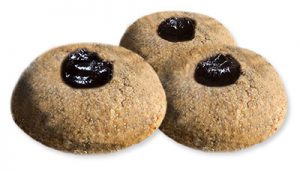Ayurveda holds pomegranates in high esteem, because they preserve vitality and youthfulness. Due to their ingredients, they are especially recommended for people with a Pitta-predominant constitution and for addressing imbalanced Pitta Dosha.
The ripe fruits also have a harmonizing effect on all three Doshas. Because of their high content of vitamin C and antioxidants, pomegranates boost the immune system and can help reduce inflammation.
The recipe presented here is a non-alcoholic drink that, due to its tart/sweet taste, reminds a little of red wine and can be a perfect substitute for it. The combination of the juice’s taste and the added spices makes it ideally suited to the energies of the winter season: it’s not just warming, but also supporting the digestion and stimulating detoxification.
Ingredients for 4–5 glasses:
- 3 cups of pomegranate juice
- 1 cup of red grape juice
- 1 orange
- ¼ cup of fresh cranberries or pomegranate seeds
- 1 thumb-sized piece of fresh ginger
- 2 Tbsp. maple syrup
- 2 cinnamon sticks
- 3 aniseed stars
- 4 cloves
Preparation:
- Of course, it’s nicest to use freshly pressed pomegranate juice, but juice from the bottle also works. If the juice is too tart, mix in some grape juice or other red juice.
- Cut orange slices as decoration, one for each glass.
- Put all ingredients in a large saucepan and heat over medium heat for about 5 minutes until the mixture starts to boil.
- Reduce the heat and simmer gently for about 10 minutes, stirring occasionally.
- Serve warm with the orange slices.
Bon appetit!
Download the recipe as a PDF file.

Almond cookies with a Chyavanprash dab

Chyavanprash is one of the centuries-old Rasayanas that have been described in Ayurveda and are universally appreciated. Rasayanas are dietary supplements that balance all three Doshas and have an overall harmonizing effect on mind and body.
The main ingredient of this precious product is fully ripe Amla fruit – originally also known as Amalaki. Amla fruits have a very high vitamin C content and contain almost all six flavors distinguished in Ayurveda: only the salty taste is not there.
Apart from enhancing memory and the immune system, Chyavanprash promotes digestion and assimilation. Especially during winter, it can be a beneficial daily supplement to strengthen the airways and your resilience to infections. Above all, the cookies from our recipe are a tasty afternoon snack – whenever you want to make an exception.
Ingredients (for 10–12 cookies):
- 1 cup of very fine almond flour
- 3 Tbsp. liquid Ghee
- 3 Tbsp. maple syrup
- 1 tsp. vanilla extract
- ⅛ tsp. salt
- ½ cup of Chyavanprash
Preparation:
Preheat the oven to 150° centigrade. Line a baking tray with baking paper.
Put all ingredients (except the Chyavanprash) in a large mixing bowl and mix well with a spoon or whisk.
Portion the mixture with a tablespoon, roll it into small balls and place them on the baking tray.
With the handle of a wooden spoon, make a dent where the Chyavanprash will be filled after baking. Chyavanprash contains honey, so it should not be baked!
In order for the cookies to keep their shape in the oven, put the tray in the refrigerator for about 20 minutes before baking.
Bake for 10–12 minutes until light golden brown.
If necessary, you can deepen the dent a little more after baking, while the cookies are still warm.
Once the cookies have cooled down, fill in the Chyavanprash with a teaspoon.
Enjoy!
Download the recipe as a PDF file.

Both recipes by Jochen Lotz
© Maharishi Ayurveda Health Centre Bad Ems